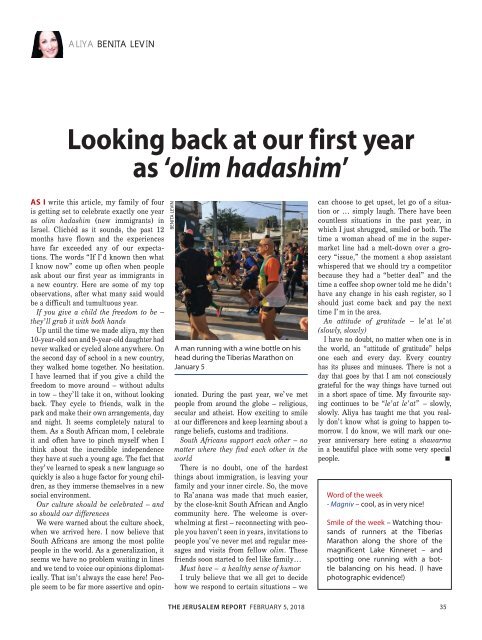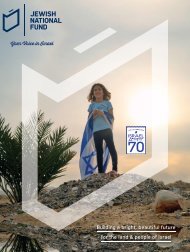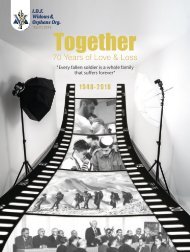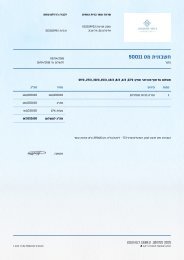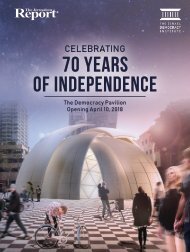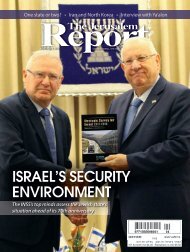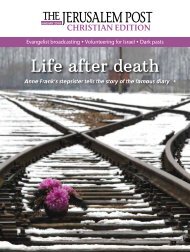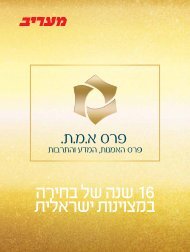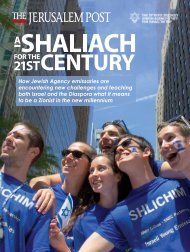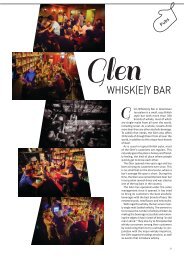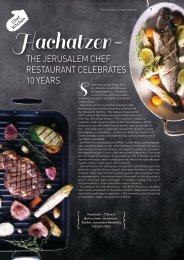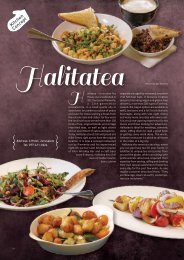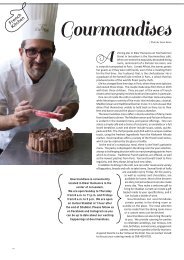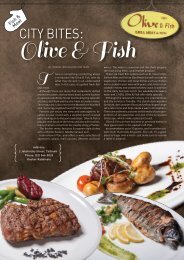All small
Create successful ePaper yourself
Turn your PDF publications into a flip-book with our unique Google optimized e-Paper software.
ALIYA BENITA LEVIN<br />
Looking back at our first year<br />
as ‘olim hadashim’<br />
BENITA LEVIN<br />
A man running with a wine bottle on his<br />
head during the Tiberias Marathon on<br />
January 5<br />
AS I write this article, my family of four<br />
is getting set to celebrate exactly one year<br />
as olim hadashim (new immigrants) in<br />
Israel. Clichéd as it sounds, the past 12<br />
months have flown and the experiences<br />
have far exceeded any of our expectations.<br />
The words “If I’d known then what<br />
I know now” come up often when people<br />
ask about our first year as immigrants in<br />
a new country. Here are some of my top<br />
observations, after what many said would<br />
be a difficult and tumultuous year.<br />
If you give a child the freedom to be –<br />
they’ll grab it with both hands<br />
Up until the time we made aliya, my then<br />
10-year-old son and 9-year-old daughter had<br />
never walked or cycled alone anywhere. On<br />
the second day of school in a new country,<br />
they walked home together. No hesitation.<br />
I have learned that if you give a child the<br />
freedom to move around – without adults<br />
in tow – they’ll take it on, without looking<br />
back. They cycle to friends, walk in the<br />
park and make their own arrangements, day<br />
and night. It seems completely natural to<br />
them. As a South African mom, I celebrate<br />
it and often have to pinch myself when I<br />
think about the incredible independence<br />
they have at such a young age. The fact that<br />
they’ve learned to speak a new language so<br />
quickly is also a huge factor for young children,<br />
as they immerse themselves in a new<br />
social environment.<br />
Our culture should be celebrated – and<br />
so should our differences<br />
We were warned about the culture shock,<br />
when we arrived here. I now believe that<br />
South Africans are among the most polite<br />
people in the world. As a generalization, it<br />
seems we have no problem waiting in lines<br />
and we tend to voice our opinions diplomatically.<br />
That isn’t always the case here! People<br />
seem to be far more assertive and opinionated.<br />
During the past year, we’ve met<br />
people from around the globe – religious,<br />
secular and atheist. How exciting to smile<br />
at our differences and keep learning about a<br />
range beliefs, customs and traditions.<br />
South Africans support each other – no<br />
matter where they find each other in the<br />
world<br />
There is no doubt, one of the hardest<br />
things about immigration, is leaving your<br />
family and your inner circle. So, the move<br />
to Ra’anana was made that much easier,<br />
by the close-knit South African and Anglo<br />
community here. The welcome is overwhelming<br />
at first – reconnecting with people<br />
you haven’t seen in years, invitations to<br />
people you’ve never met and regular messages<br />
and visits from fellow olim. These<br />
friends soon started to feel like family…<br />
Must have – a healthy sense of humor<br />
I truly believe that we all get to decide<br />
how we respond to certain situations – we<br />
can choose to get upset, let go of a situation<br />
or … simply laugh. There have been<br />
countless situations in the past year, in<br />
which I just shrugged, smiled or both. The<br />
time a woman ahead of me in the supermarket<br />
line had a melt-down over a grocery<br />
“issue,” the moment a shop assistant<br />
whispered that we should try a competitor<br />
because they had a “better deal” and the<br />
time a coffee shop owner told me he didn’t<br />
have any change in his cash register, so I<br />
should just come back and pay the next<br />
time I’m in the area.<br />
An attitude of gratitude – le’at le’at<br />
(slowly, slowly)<br />
I have no doubt, no matter when one is in<br />
the world, an “attitude of gratitude” helps<br />
one each and every day. Every country<br />
has its pluses and minuses. There is not a<br />
day that goes by that I am not consciously<br />
grateful for the way things have turned out<br />
in a short space of time. My favourite saying<br />
continues to be “le’at le’at” – slowly,<br />
slowly. Aliya has taught me that you really<br />
don’t know what is going to happen tomorrow.<br />
I do know, we will mark our oneyear<br />
anniversary here eating a shawarma<br />
in a beautiful place with some very special<br />
people.<br />
<br />
Word of the week<br />
- Magniv – cool, as in very nice!<br />
Smile of the week – Watching thousands<br />
of runners at the Tiberias<br />
Marathon along the shore of the<br />
magnificent Lake Kinneret – and<br />
spotting one running with a bottle<br />
balancing on his head. (I have<br />
photographic evidence!)<br />
THE JERUSALEM REPORT FEBRUARY 5, 2018 35


